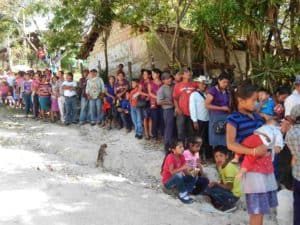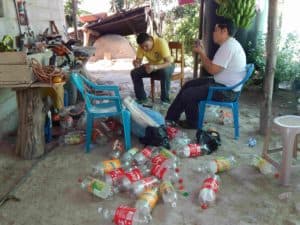
December 3, 2014
My wife Laura and I spent yesterday mountain climbing. It wasn’t intentional. We were visiting San Marcos de la Sierra. From where the bus dropped us off we walked straight down, probably 1500 feet to the town center. A little later in the day we visited a second community of San Marcos called Aguacate, on the other side of the highway. We walked back up to the highway, then descended the other side, probably about 2000 feet. Returning to the highway at the end of the day to leave, we took the shortcut up, a harrowing path that most mountain goats would think twice about traversing.
The people who live in San Marcos face these difficult uphill climbs daily, both literally and figuratively. There is little to no income or jobs in San Marcos. Most families are subsistence farmers living hand to mouth. They are isolated in this most remote, rural, and rugged territory. Poverty means malnourishment, poor health, shorter life expectancy, more risk of child mortality, less education and little opportunity for success, and all of this while scaling mountains.

These people are easily lost and forgotten, even by the rest of Honduras. That is why what is happening with the Universidad Nacional Autónoma de Honduras (National Autonomous University of Honduras, UNAH) is something very special. When Laura and I arrived at the center of town, we saw an unusual sight. The presence of even a car or truck would have elicited special note, but here were three large buses from UNAH parked alongside the church. They had brought in the seventy plus students and faculty. Generally we think of brigades, medical or otherwise, as coming from the outside, foreigners with abundant foreign resources. But here were Honduran students and faculty responding in a generous and intense way to the needs of this small municipality and its people. The commitment of UNAH to the people of San Marcos clearly articulates a powerful message: You are not lost nor forgotten by the rest of Honduras.
There would only be one full day of the brigade, so it was no surprise to see the long lines outside the public school building where the doctors and nurses were. We’ve become somewhat acquainted with the medical brigade motif. But things here were different. The most obvious difference was that there were no translators. This allows for a deep sense of trust and respect, something that for all the best intentions of foreign brigades cannot be reproduced. We had already met the engineering students in the main plaza area of the town, discussing the town’s unique water problems and how they might be addressed. At the clinic area itself, in each of the examining areas, a law student or a lawyer was present for legal consults. Here were doctors, nurses, orthodontists, lawyers, engineers, teachers, biologists, and so many more. It seemed every profession discipline that could possibly assist this small town community was present. We even met a social worker. Laura and I are both social workers, and we had long since given up on meeting a Honduran one. It bought us great joy.
So why were all these professions present at a one day medical brigade? It seems the university’s commitment is way beyond the one day brigade. As the mayor of the town, whom we met with later in the day in Aguacate, told us, this is a “convenio” (covenant agreement) that will last for decades. This is not about giving a person a lift up the hill one time, leaving them off at the side of the road to wait for the bus, then scooting off to Tegucigalpa in your Land Cruiser. No, this is about commitment and building relationship. This is a partnership. The brigade was for a day, but the relationship is ongoing. They’ll come back next year for another day’s brigade. But over the course of the year, there will be a great deal of communication and ongoing work; the mayor with the university, the university with Shoulder to Shoulder, the health center of the town with the university, the various local associations with the university, and so on. Francisco Portillo, the social worker, explained it to us as an ongoing needs assessment and a continual search for creative resources; going up and down the hill.

We had a great day climbing mountains. We thank Manuel, one of Shoulder to Shoulder’s health promoters, and Carlos, Shoulder to Shoulder’s health data collector, for guiding us around all day; Paola Barrientos, nursing department at UNAH, who has a ton of energy and is thoroughly dedicated to this project; Doctor Maricela Figueroa, one of the brigade leaders, who graciously shared the inclusive mission of their work; the mayor of San Marcos; and so many others.
…. and if there are tall mountains to climb, we’ll climb them together.


